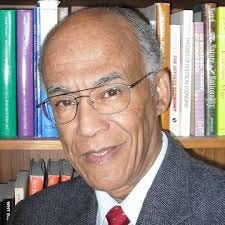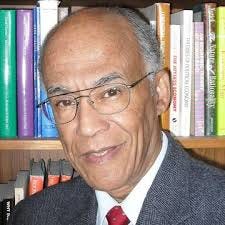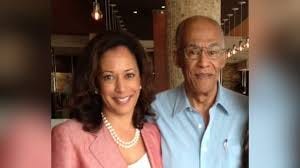Today In Black History: Dr. Donald J. Harris
Esteemed Jamaican-American Economist, Stanford Professor Emeritus, and father of Vice President Kamala Harris
Issue #719 Today In Black History, Friday, August 30, 2024
Did you know that you can listen to each “We Are Speaking” post on the Substack App? Download the app!
Help us to reach our August 2024 goals: +100 total new subscribers, including +35 new paid subscribers.
Please share and subscribe to help us grow our publication.
If you like us, REALLY like us, please click the “Like” button at the end of this post!
We appreciate your support!
Donald Jasper Harris, OM, was born August 23, 1938, in Saint Ann Parish, Jamaica. He attended the University College of the West Indies before earning a Bachelor's degree from the University of London and a PhD from the University of California, Berkeley. Before joining Stanford University as a professor of economics, he held professorships at the University of Illinois at Urbana-Champaign, Northwestern University, and the University of Wisconsin-Madison.
Dr. Harris has worked extensively on analysis and policy regarding Jamaica's economy. He served in Jamaica, at various times, as an economic policy consultant to the government and an economic adviser to successive prime ministers.
In 2021, Dr. Harris was awarded Jamaica's Order of Merit (OM), the country's third-highest national honor, for his "contribution to national development.”
In 1972, he joined the Stanford University faculty as a professor of economics and became the first Black scholar to be granted tenure in Stanford's Department of Economics. At various times, he was a visiting fellow at Cambridge University and Delhi School of Economics and a visiting professor at Yale University. He served on the editorial boards of the Journal of Economic Literature and the Journal of Social and Economic Studies. He is a longtime member of the American Economic Association.
Harris directed the Consortium Graduate School of Social Sciences at the University of the West Indies from 1986 to 1987. He was a Fulbright Scholar in Brazil in 1990 and 1991 and Mexico in 1992. In 1998, he retired from Stanford and became a professor emeritus.
Jamaica has been considered an economic success story in recent years, as it has achieved sustained economic growth and significant reductions in public debt. Some allies attribute this success to an agreement between Jamaica and the International Monetary Fund made possible through Dr. Harris's growth strategy for Jamaica.
Dr. Harris's academic career is marked by his contributions to development economics, economic theory, and public policy. His research and teachings have profoundly impacted the understanding of economic systems, particularly with the Caribbean and Third World development. As a professor at Stanford University, Dr. Harris influenced countless students with his rigorous approach to economic theory and his dedication to equity and justice in economic policies.
Dr. Harris is the father of Vice President Kamala Harris, who has stated that she and her father are “not close.” We don’t know why Kamala’s parents divorced. Still, Dr. Donald Harris has stated that he was very bitter about California laws at the time that gave complete and total custody of Kamala and Maya to their mother, helping to all but cut him out of their lives after the divorce.
As the first female Vice President of the United States and the highest-ranking female official in U.S. history, Kamala Harris has often spoken about her father's significant influence on her life and career. Dr. Harris instilled in her the values of hard work, intellectual rigor, civil rights, and public service, underscoring the importance of education and justice.
Dr. Harris has also stated that he did not intend to be a “celebrity” about his daughters’ accomplishments.
However, Dr. Donald J. Harris's legacy is a testament to the power of intellectual pursuit and the impact one individual can have on their immediate family and broader society. His life's work is an enduring reminder of the importance of academic excellence, resilience, and the tireless pursuit of equity.
Today In Black History
In 1838, the first African American magazine, “Mirror of Freedom,” began publication in New York City.
In 1843, Blacks participated for the first time in a national political convention, the Liberty Party Convention, in Buffalo, N.Y.
In 1856, the African Methodist Episcopal Church established HBCU Wilberforce University of Ohio.
In 1879, former slaves founded Simmons College of Kentucky, the oldest HBCU in the state.
In 1881, Black inventor W. S. Campbell patented the self-setting animal trap.
In 1956, a white mob prevented the enrollment of Blacks at Mansfield High School in Texas.
In 1961, James Benton Parsons was confirmed as the first African American U.S. District Judge.
In 1966, Constance Baker Motley was confirmed as a U.S. district judge, becoming the first Black woman on the federal bench.
In 1967, Thurgood Marshall was confirmed by the Senate to become the first Black U.S. Supreme Court Associate Justice.
In 1983, Lt. Col. Guion S. Bluford, Jr. became the first Black astronaut to go into space.
Our paid subscribers are encouraged to discuss this post in our W.A.S. Chat Community.
Join Pamela Hilliard Owens’s subscriber chat
Available in the Substack app and on the web
You are also welcome to view “We Are Speaking” in Substack Notes. You can also read other Substack publications without subscribing to them when you join Notes.







